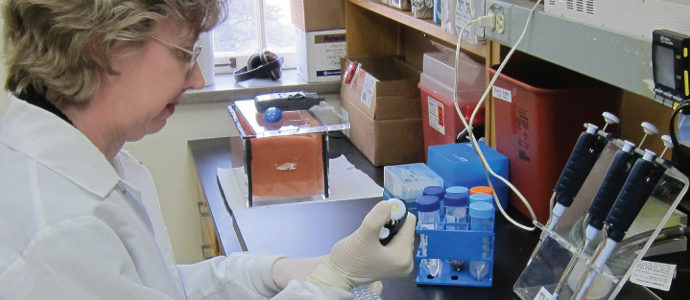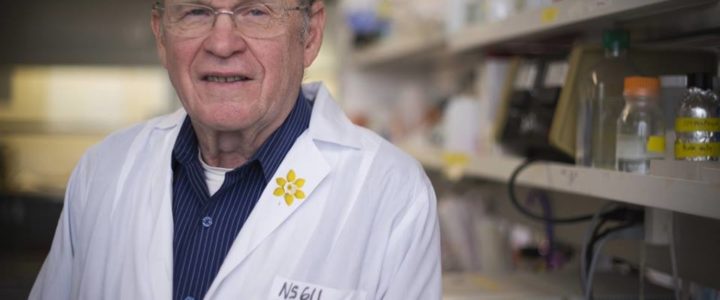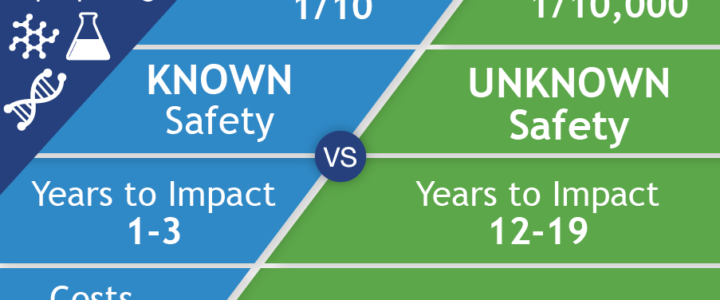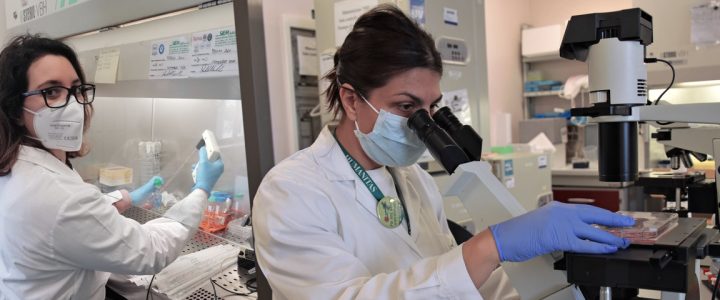Each year, FRAXA funds a diverse portfolio of research. Our FRAXA Fellowships are seed funding for the future, the feedstock for the Fragile X treatment development pathway. While we are looking to promote as many promising new approaches as possible, prominent themes emerge each year, as scientists around the world tackle previously neglected areas.
Read moremetformin
Contribution of Microglia to the Therapeutic Effects of Metformin and Adiponectin in Fragile X Syndrome

The research team of Brian Christie, PhD and Marie-Eve Tremblay is developing ways to balance hormones, including drugs like metformin and changes in diet, which could not only reduce hunger and obesity, but ultimately also improve learning and behavior in Fragile X syndrome.
Read moreKetogenic Diet Eases Symptoms in Fragile X Male Mice

The Westmark laboratory continues to study sleep and rest-activity cycles in Fragile X mice as a potential outcome measure that correlates between preclinical and clinical research. The analysis of sleep EEG in the mice has proven more labor intensive than they anticipated, but the team is collaborating with Dr. Rama Maganti’s laboratory at UW-Madison on the development of computer scrips to speed up the analysis.
Read moreDrug Repurposing for Rare Disease and the Future of Health – The Genetics Podcast

In this double-bill episode of The Genetics Podcast, Dr. Patrick Short talks to two key rare disease researchers in the field: Dr. Bruce Bloom, CCO of Healx, and Dr. Mike Tranfaglia, CSO of FRAXA. Both draw on their wide-ranging personal and professional experiences to discuss the successes and opportunities of drug repurposing, the power of using machine learning, and the work they’ve been doing to aid in finding effective treatments for Fragile X.
Read moreTargeting Adiponectin to Treat Fragile X Syndrome

FRAXA Research Foundation has awarded a $30,000 research grant to principal investigator Brian Christie, PhD, and postdoctoral fellows Jonathan Thacker, PhD, and Luis Bettio, PhD, at the University of Victoria. They are investigating whether boosting the hormone adiponectin can effectively treat Fragile X syndrome. This project is funded in partnership with the Fragile X Research Foundation of Canada, which is providing an additional $15,000.
Read moreHealx Raises $56M to use AI to Find Treatments for Fragile X & Other Rare Diseases

Healx has secured $56M in new financing to build a clinical-stage portfolio for rare diseases, including treatments for Fragile X syndrome, and to launch a global Rare Treatment Accelerator program. Where the traditional drug discovery model takes more than a decade and can run into the billions of dollars, Healx’s AI-driven approach makes the process faster, more efficient and cost-effective.
Read moreClinical Trial of Metformin for Fragile X Syndrome

Metformin is commonly prescribed to control high blood sugar in type 2 diabetes. With a $50,000 grant from FRAXA Research Foundation, Dr. Artuela Çaku and Dr. Francois LePage are conducting an open-label clinical trial of metformin for children and adults with Fragile X syndrome, at the University of Sherbrooke in Canada.
Read moreScreening 2,320 FDA-Approved Drugs for Potential Treatment of Fragile X

FRAXA Research Foundation has awarded a $90,000 grant to Principal Investigator Dr. Sean McBride and Postdoctoral Fellow Dr. Karen Joyce, at Rowan University, to screen all 2,320 FDA-approved drugs on both mouse and fly models of Fragile X syndrome. Those drugs which show promise will be tested in more detail for potential to treat Fragile X in humans.
Read moreMetformin and Aberrant Insulin Signaling in a Fragile X Mouse Model

This 2017-2018 grant of $90,000 is funded jointly by FRAXA and the Fragile X Research Foundation of Canada for the first year. A previous FRAXA grant to the Sonenberg lab has led to great interest in the available drug, metformin, as a potential treatment for Fragile X syndrome. FRAXA is currently organizing clinical trials of metformin.
Read moreIn Their Own Words: Reports From the International Fragile X Workshop

The 18th International Fragile X and Related Neurodevelopmental Disorders Workshop in Quebec, Canada, was a great success, featuring Fragile X much more heavily than any previous meeting in this series! We asked our speakers to summarize their work in their own words, with brief updates from researchers investigating Fragile X.
Read moreFRAXA Wins Award for Drug Repurposing

Cures Within Reach, the leading global nonprofit focused on repurposing research as a fast track to saving patient lives, has awarded FRAXA Research Foundation the 2017 Golan Christie Taglia Patient Impact Philanthropy Award for efforts to find treatments for the rare disease Fragile X syndrome.
Read moreMetformin, Diabetes Drug, Potential Fragile X Treatment

“We treated mice with metformin and corrected all the core Fragile X deficits. We are optimistic about using metformin in human clinical trials. This is a generic drug with few side effects” says Nahum Sonenberg, PhD, James McGill Professor, Department of Biochemistry, McGill Cancer Center, McGill University.
Read moreRepurposing Available Drugs to Treat Fragile X Syndrome – FRAXA Initiatives

FRAXA Research Foundation was founded in 1994 to fund biomedical research aimed at finding a cure for Fragile X syndrome and, ultimately, autism. We prioritize translational research with the potential to lead to improved treatments for Fragile X in the near term. Our early efforts involved supporting a great deal of basic neuroscience to understand the cause of Fragile X. By 1996, these efforts had already begun to yield results useful for drug repurposing. To date, FRAXA has funded well over $25 million in research, with over $3 million of that for repurposing existing drugs for Fragile X.
Read moreFragile X Fruit Fly Research Bears Fruit

A new FRAXA-funded study shows how the hormone insulin – usually associated with diabetes — is involved in the daily activity patterns and learning deficits in the fruit fly model of Fragile X Syndrome (FXS). The study also reveal a metabolic pathway that can be targeted by new and already approved drugs to treat Fragile X patients, notably metformin.
Read moreTargeting AMP-Activated Protein Kinase Pathway in Fragile X Syndrome

With a $100,000 grant from the FRAXA Research Foundation in 2015, Dr. Peter Vanderklish explored a novel strategy to treat Fragile X syndrome: AMPK activators. The good news is that there are FDA approved (for example, metformin) and naturally occurring AMPK activators (such as resveratrol, found in red wine).
Read moreFruit Flies to Model and Test Fragile X Treatments

Dr. Jongens and his collaborators have found an insulin-like protein in the fly brain that is overexpressed in the Fragile X mutant fly, leading to increased activity of the insulin signaling pathway. Furthermore, they found that certain behavioral patterns in the Fragile X flies can be rescued by expressing the FX gene just in insulin producing neurons in the fly brain. In the mutant, there are other changes in the signaling pathways, including a decrease in cAMP and elevation in PI3K, mTOR, Akt and ERK activity. They now propose to study 2 medicines used for diabetes: pioglitazone (increases cAMP and decreases Akt and ERK) and metformin (inhibits mTOR), in flies and mice to validate the potential efficacy of these novel therapeutics for Fragile X.
Read moreFRAXA Grant to Nahum Sonenberg, PhD — Effects of metformin in Fmr1 knockout mouse model of Fragile X syndrome

Mis-regulation of activity-dependent protein synthesis is one of the major cellular abnormalities found in Fragile X. Upstream neuronal signaling regulates a large cluster of enzymes called the mTORC1 complex, which in turn regulates protein synthesis. This complex is also controlled by cellular energy levels via the metabolic sensor AMP-activated Protein Kinase (AMPK). AMPK is a highly conserved kinase that is activated under conditions of energy stress, when intracellular ATP levels decline and intracellular AMP increases.
Read more
